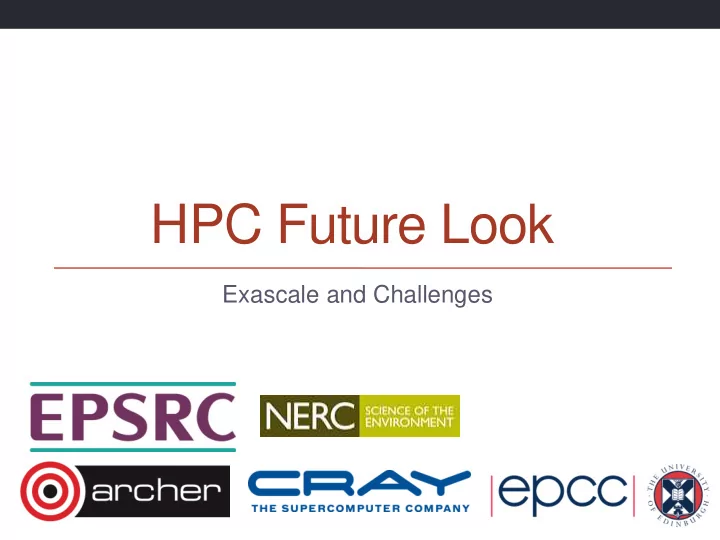

HPC Future Look Exascale and Challenges
Outline • Future architectures • Exascale initiatives • Processors • Memory • Impacts on performance • Software challenges • Parallelism and scaling • New algorithms • What about software that does not scale? • Impact for standard computing
Future architectures What will HPC machines look like?
What will future systems look like? 2014 2016 2020 System Perf. 35 Pflops 100-200 PFlops 1 EFlops Memory 1 PB 5 PB 10 PB Node Perf. 200 Gflops 400 GFlops 1-10 TFlops Concurrency 32 O(100) O(1000) Interconnect BW 40 GB/s 100 GB/s 200-400 GB/s Nodes 100,000 500,000 O(Million) I/O 2 TB/s 10 TB/s 20 TB/s MTTI Days Days O(1 Day) Power 10 MW 10 MW 20 MW
Processors • More Floating-Point compute power per processor • Only exploit this power via parallelism • Lots of low power compute elements combined in some way
Memory • Will be packaged with processor • Increases power efficiency, speed and bandwidth… • …at the cost of smaller memory per core
System on a chip • Instead of separate: • Processor • Memory • Network interface • Combined system package where all these things are included in one manufactured part • This is the only way to improve power efficiency • Less scope for customisation • If you need more memory than in package you will have to have levels of memory hierarchies
Software challenges What does software need to do to exploit future HPC?
What does this mean for applications? • The future of HPC (as for everyone else): • Lots of cores per node (CPU + co-processor) • Little memory per core • Lots of compute power per network interface • The balance of compute to communication power and compute to memory are both radically different to now • Must exploit parallelism at all levels • Must exploit memory hierarchy efficiently
Algorithms • For many problems new algorithms will be needed • May not be optimal but contain more scope for parallelisation • Mixed-precision will become more important
Applications that do not scale • The good news is that if you do not need to be able to treat larger/more-complex problems then you can access more of current resource size • May be caught out by decrease in memory per core • Options to scale in trivial-parallel way: increase sampling, use more sophisticated statistical techniques • This may well be the best route for many simulations
Impact on standard computing What does this mean for my workstation?
Parallel everywhere • All current computers are parallel • From supercomputers all the way down to mobile phones • Most parallelism is task-based on 4-8 cores – each application (task) runs on an individual core. • In the future: • More parallelism per device – 10s to 100s cores running at lower clock speeds • All applications will have to be parallel • Parallel programming skills will be required for all application development. • More system on a chip – more things will be packaged together
Summary • Hopefully you should now have some understanding of HPC, its uses and users • Plenty more to learn! • A lot of people use HPC without programming • Use available parallel programs and simulation packages • Understanding HPC services and how you’re intended to use them hopefully will enable you to get best use from them
Recommend
More recommend